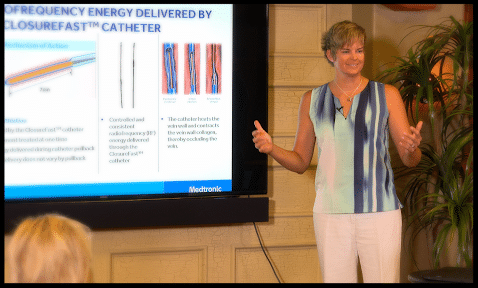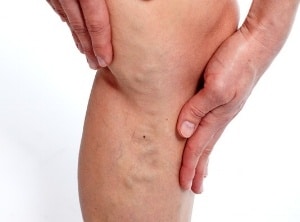Want to Know Vein Treatment Success Rates? Just Ask.
 As a smart consumer and advocate for your own health, you have likely done your research about the variety of varicose vein treatments available, and you have probably noticed that vein procedure success rates are hard to find. Some try. There are statistics tucked into difficult-to-read research abstracts and surveys. Some reports contradict others. Others offer success rate ranges with a twenty point spread.
As a smart consumer and advocate for your own health, you have likely done your research about the variety of varicose vein treatments available, and you have probably noticed that vein procedure success rates are hard to find. Some try. There are statistics tucked into difficult-to-read research abstracts and surveys. Some reports contradict others. Others offer success rate ranges with a twenty point spread.
The truth is, there are no simple and definitive answers. If you really do want to get a sense of your personal best course of treatment—and the kind of results that you can expect—the smartest thing that you can do is consult with a qualified vein specialist.
What Constitutes Varicose Vein Treatment Success?
Now, understand that when we talk about varicose veins treatment, we are mostly talking about veins being removed, obliterated or completely closed off in some way. When the treatment is successful, those veins are not coming back. Be assured that removing some veins is a safe practice—when it is done by a qualified professional. Your venous system is complex, and has backups built into it, and it is better for your overall vascular health to remove a few damaged veins than to leave them as they are, reservoirs for blood to pool and potentially lead to complications, such as lymphedema, ulcerations, or chronic venous insufficiency.
At this point, you probably have a list of questions for your vein specialist that is longer than your arm. Here are a few more suggestions:
Which Varicose Veins Procedures Do You Offer?
Remember that old adage, “If the only tool in your toolbox is a hammer, everything looks like a nail?” This applies to veins as well. There are a variety of highly effective, minimally invasive vein treatment procedures available now. But while sclerotherapy (for example) might work well on spider veins and small venules, larger vessels will respond better to Thermal Ablation or the VenaSeal procedure. It takes an experienced vein specialist with a well equipped toolkit to understand which of these procdedures will work best on each of your veins. A good one will likely incorporate more than one procedure in your tailored treatment plan.
Do You Use Duplex Ultrasonography?
This powerful diagnostic technology overlays a three dimensional view of blood flowing through veins over a two-dimensional view of the structure of the veins. This allows your qualified vein specialist valuable insight into your vascular health, where it might be compromised, and how it can best be fixed. It is also a valuable tool for assessing success during treatment—and after. If your vein specialist is not using this technology, the follow-up question should be, “why not?”
How Many Peripheral Varicose Vein Procedures Have You Performed?
There are a lot of vein specialists who offer a lot of services for a range of conditions. This might mean that they have only performed the particular procedure that they are suggesting for you a few times. Consider seeking out a vein specialist who specializes in peripheral varicose vein treatments. It is more likely that they will have performed this treatment thousands of times. More experience means more refined skills—and greater sense of outcome.
What Can I Do to Ensure That I Have the Most Successful Procedure Possible?
The short answer to this one should be, “take care of yourself.” When all has been done properly, if you experience the reappearance of varicose veins, it is possible that other untreated veins have since developed varicosities. While genetics are a strong indicator for this, there are things you can do to minimize further damage to your vascular health, such as maintaining a healthy body weight, exercising, eating for health, and following the post-procedure self-care suggestions given you by your qualified vein specialist.
When it comes down to it, optimizing your chances for varicose vein treatment success means receiving the right treatment for the right situation from the person with the right experience. Book your free consultation with a qualified vein specialist today.
Is there anything worse than itchy varicose veins? Maybe, but itchy veins remains high on the list of issues we would love to resolve before they drive us crazy. If you are experiencing itching around your varicose veins, it could be a message from your body that it is time to have your veins checked…
Read MoreThe full story on Chronic Venous Insufficiency, what it is and how to treat it. A video presentation by Jilanne Rose, DNP-C, Clinical Director. Run Time 24:46. TRANSCRIPT What’s the Difference Between Veins and Arteries? When we talk about vascular health and vascular disease most people think about arteries. When we talk about the…
Read MoreA group of Gilbert Arizona Residents concerned about Chronic Venous Insufficiency gathered on Saturday July 16th for an interactive discussion on CVI symptoms, causes and treatments. Chronic Venous Insufficiency, Venous Reflux Disease and Varicose Veins affect over 30 million American men and women. Unfortunately, many do not get treated as they believe varicose veins are…
Read MoreCan Chronic Venous Insufficiency (CVI) be reversed? Unfortunately the short answer to this question is no; but CVI can be treated with minimally invasive procedures which can reduce symptoms and improve quality of life tremendously! Chronic Vein Insufficiency Causes In order to understand why venous insufficiency or peripheral venous insufficiency cannot be reversed, we must…
Read MoreWhat can you do to treat bleeding varicose vein and spider veins? First and foremost, don’t panic. Although the visual effect of a ruptured varicose vein or bleeding vein can be alarming, there are some simple things that can be done to get the bleeding to stop. If you can reach the area that is…
Read MoreWhy are varicose veins painful? The discomfort associated with varicose veins is caused by a combination of factors. When veins are weak, the blood which is supposed to return to the heart in a timely fashion, settles and pools in the superficial vein system. This pooling of blood worsens when patients stand or sit in…
Read MoreEndovenous Ablation Definition Taken literally, endovenous ablation is the removal of a vein from within. ‘Endo’ means internal or inside, ‘venous’ refers to a vein, and ablation is to ‘remove’. In the instance of veins, it is no longer necessary to physically remove a vein from the leg (vein stripping) to improve symptoms or the…
Read MoreThe newest procedure for the treatment of varicose veins was approved by the FDA about two years ago. It is what has been termed a non-tumescent non-thermal therapy. What this means is that it does not require a lot of numbing medicine to complete, and it does not use a heating element to close or…
Read MoreWhat is the best treatment for varicose veins? No varicose vein is the same; no person’s symptoms are the same; and so the best procedure for varicose veins is not always the same. The treatments associated with vein disease are based on a patient’s symptoms, vein size, location, contributing conditions, and ultrasound findings. Different…
Read More

